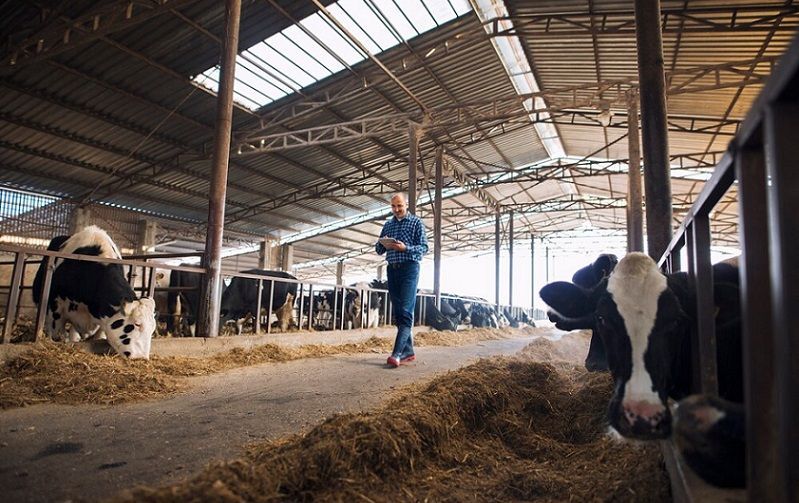South Carolina Dairy Farm Pioneers Sustainability with The Dairy Alliance
Source: DairyNews.today
Hickory Hill Milk, a family-owned dairy farm in Edgefield, South Carolina, is leading the charge in sustainable farming practices, setting a benchmark for the dairy industry in the Southeast. Partnering with The Dairy Alliance, a nonprofit organization funded by dairy farm families, Hickory Hill is embracing cutting-edge technology and innovative resource recycling methods to significantly reduce its environmental footprint.

As the dairy industry intensifies efforts to lower greenhouse gas emissions, farms like Hickory Hill are turning to advanced technologies to address challenges such as labor shortages and to enhance operational efficiency. At Hickory Hill, owned by the Dorn family, advancements in genetics and cow comfort have led to remarkable increases in milk production, resulting in lower emissions per gallon of milk produced. The integration of data-driven management tools has further optimized cow care, enabling early detection of health issues through activity monitors, which has improved the overall productivity and well-being of the herd.
Watson Dorn, owner of Hickory Hill Milk, emphasizes the long-standing commitment of farmers to environmental stewardship. "As I always say, farmers are the original environmentalists. My grandparents knew that if they didn’t care for the soil, it wouldn’t sustain them. It’s the same with my cows—if I don’t look after them, they can’t support me. Caring for my cows is a top priority, and sustainability is essential for us."
While the dairy industry is a relatively minor contributor to greenhouse gas emissions, farms like Hickory Hill play a crucial role in advancing sustainability. Across the Southeast, dairy farms are adopting regenerative practices, leveraging technology, and implementing best management techniques to conserve natural resources and contribute positively to their communities.
The Dorn family exemplifies these efforts through innovative resource recycling methods. At Hickory Hill, sand used for bedding is recycled, and water is reused multiple times throughout the dairy's operations. For instance, water initially used to cool milk through a plate heat exchanger is subsequently repurposed to clean equipment. A sophisticated flush system in the free stall barns collects enriched water and manure, which are then utilized for irrigation and fertilization of fields. Additionally, the system allows for the cleaning and reuse of loose sand as bedding, further minimizing waste.
Geri Berdak, CEO of The Dairy Alliance, praised the region's dairy farmers for their proactive approach to sustainability. "We are proud of our Southeast farmers for embracing advanced technology that benefits their operations, their cows, and their communities. Our commitment is to advocate for sustainability in the dairy industry and continue highlighting its importance."
Hickory Hill Milk's efforts underscore the potential for dairy farms to be at the forefront of environmental stewardship, demonstrating that sustainable practices are not only achievable but also beneficial to both the industry and the broader community.
Watson Dorn, owner of Hickory Hill Milk, emphasizes the long-standing commitment of farmers to environmental stewardship. "As I always say, farmers are the original environmentalists. My grandparents knew that if they didn’t care for the soil, it wouldn’t sustain them. It’s the same with my cows—if I don’t look after them, they can’t support me. Caring for my cows is a top priority, and sustainability is essential for us."
While the dairy industry is a relatively minor contributor to greenhouse gas emissions, farms like Hickory Hill play a crucial role in advancing sustainability. Across the Southeast, dairy farms are adopting regenerative practices, leveraging technology, and implementing best management techniques to conserve natural resources and contribute positively to their communities.
The Dorn family exemplifies these efforts through innovative resource recycling methods. At Hickory Hill, sand used for bedding is recycled, and water is reused multiple times throughout the dairy's operations. For instance, water initially used to cool milk through a plate heat exchanger is subsequently repurposed to clean equipment. A sophisticated flush system in the free stall barns collects enriched water and manure, which are then utilized for irrigation and fertilization of fields. Additionally, the system allows for the cleaning and reuse of loose sand as bedding, further minimizing waste.
Geri Berdak, CEO of The Dairy Alliance, praised the region's dairy farmers for their proactive approach to sustainability. "We are proud of our Southeast farmers for embracing advanced technology that benefits their operations, their cows, and their communities. Our commitment is to advocate for sustainability in the dairy industry and continue highlighting its importance."
Hickory Hill Milk's efforts underscore the potential for dairy farms to be at the forefront of environmental stewardship, demonstrating that sustainable practices are not only achievable but also beneficial to both the industry and the broader community.









